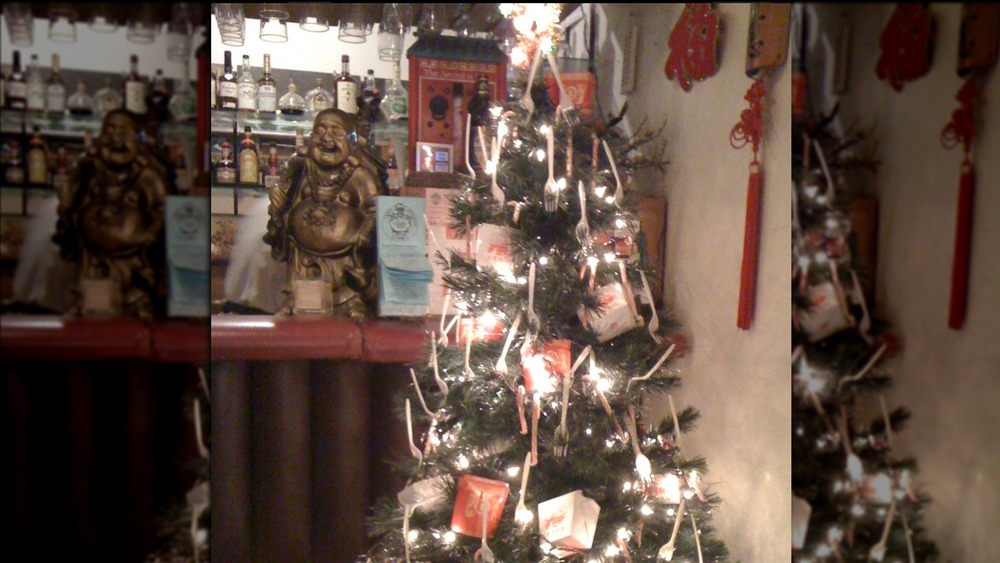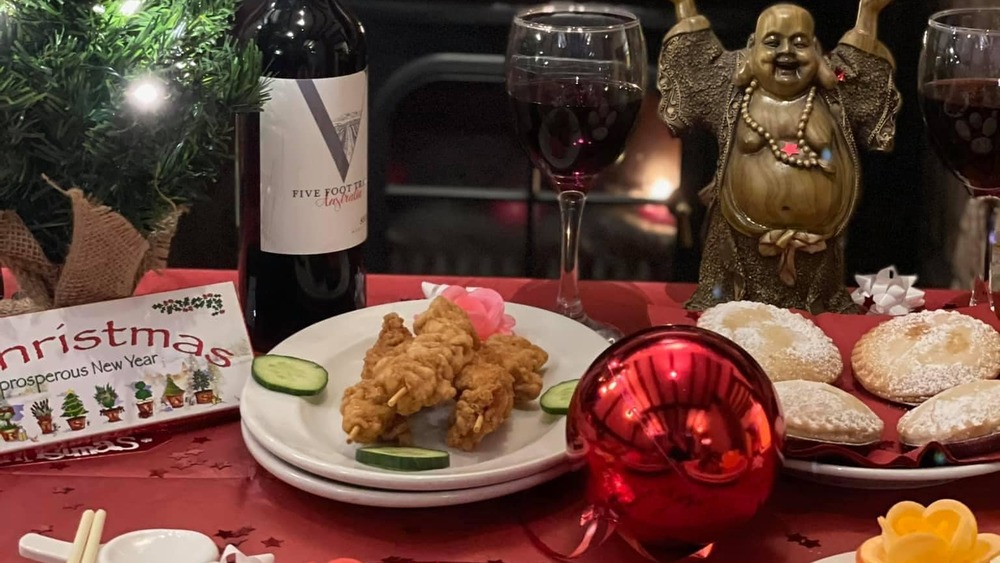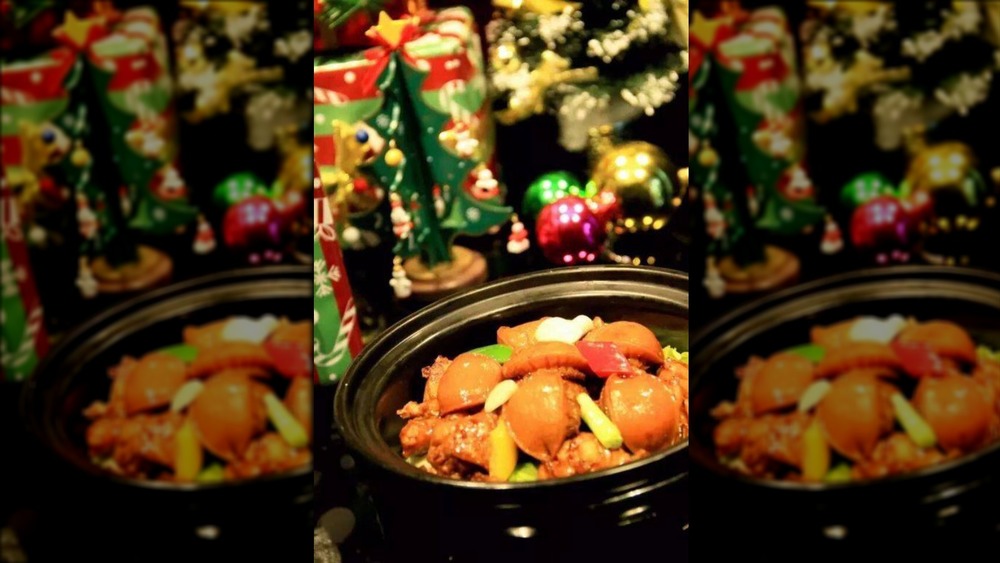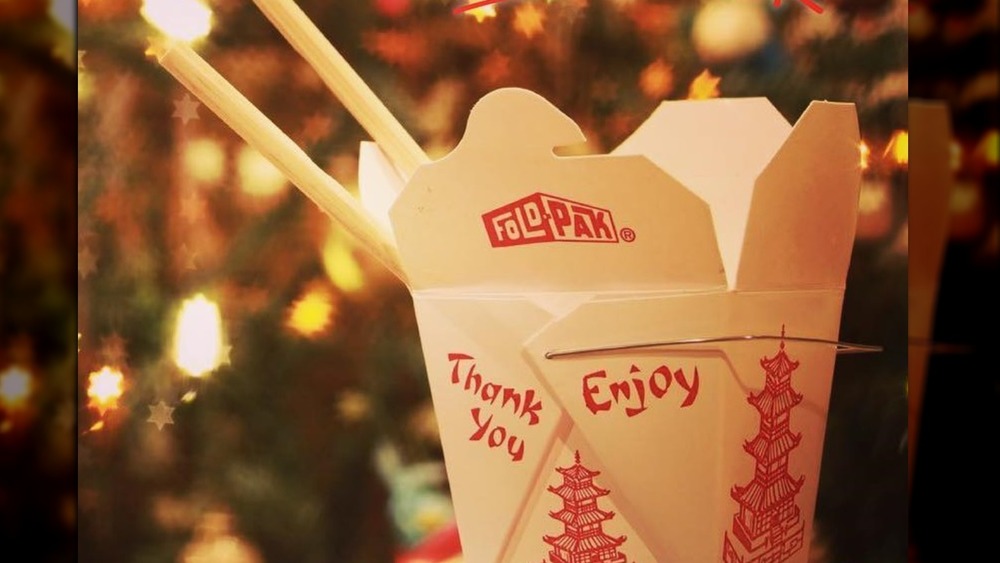The Real Reason Chinese Food On Christmas Is A Jewish Tradition
On Christmas Day, a time when many of us are at home gathered with family around an over-decorated tree surrounded by piles of crumpled wrapping paper and preparing to feast on a holiday meal that's basically Thanksgiving redux, one business is absolutely bustling: Chinese restaurants. According to food blog First We Feast, popular Manhattan restaurant Shun Lee West typically books up 3 weeks in advance, seating 1,300 tables every Christmas Day. The majority of the clientele dining there may well be Jewish, since, as Food Network star Molly Yeh put it on her blog My Name is Yeh, you need "chinese food for a merry jewish christmas!"
Yeh, whose background combines both cultures, is a huge fan of this tradition, and she's hardly the only one. When Senator Lindsey Graham (R-SC) asked Supreme Court Justice Elena Kagan during her 2010 confirmation hearing where she'd spent the previous Christmas, The Atlantic reports that she replied: "You know, like all Jews, I was probably at a Chinese restaurant." Senator Chuck Schumer (D-NY), also Jewish, explained: "no other restaurants are open." So is that the whole reason behind the tradition? American Jews are just passing up the tempting alternatives of dining at (almost) never-closed Waffle House in favor of kung pao chicken? Well, no, it seems there's a lot more history that lies behind this long-established tradition.
It all started on the Lower East Side
Rabbi Joshua Plaut, author of A Kosher Christmas: 'Tis The Season To Be Jewish, spoke with NPR about how the whole Chinese/Jewish Christmas food thing began. Plaut reveals that the first recorded convergence of Chinese food + Jews + Christmas occurred in 1935 when, according to The New York Times, a man named Eng Shee Chuck brought chow mein to the Jewish Children's Home in Newark, N.J. on Christmas Day.
Jewish people had evidently been noshing on egg rolls for a lot longer than that, however. Plaut spoke of an 1899 article in a weekly publication called the American Jewish Journal calling out Jews who ate at non-kosher restaurants, particularly Chinese ones. Well, as Newsweek notes, the heavily Jewish Lower East Side was right next door to NYC's Chinatown, and as everybody knows, it's hard to walk past a Chinese restaurant and not get hungry as soon as you smell what's cooking. It's also likely that American Jews, typically a more urban population, as were Chinese immigrants, came to see Chinese cuisine as something more cosmopolitan than more typical American meat and potatoes fare. They were eager to embrace such sophistication as part of their identity, particularly at a time of year when it seems that "the norm" is based on a celebration that excludes anyone outside the Christian faith.
Chinese food fits Jewish dietary restrictions, too
Many Jews, particularly Orthodox ones, follow very specific dietary laws as outlined in the Torah (via Jewish Virtual Library). In order to keep kosher, not only are certain foods (like pork and shellfish), but so are certain methods of food preparation, cooking, and serving. Meat and dairy, for example, should not be eaten together, so no cheeseburgers on a kosher menu. Jennifer 8. Lee, producer of The Search for General Tso, told The Atlantic that the other two main ethnic cuisines in the U.S., those being Italian and Mexican, do tend to combine cheese with meat while Chinese food does not.
Not to mention, any unkosher items such as shrimp may be harder to see in Chinese food because they're all chopped up and buried in heaps of veggies and noodles, so are therefore less offensive than if they're sitting right out there on the plate. Thus was the concept of what NPR host Robert Siegel referred to as "safe trayf" born.
How to have a Merry Jewish Christmas
If you haven't had the foresight to book well in advance and you find there's no room at the Hunan Inn, you can always order Chinese delivery for Christmas (back in the pre-Grub/Uber/Dash days, Chinese food was often the only delivery alternative to pizza), or you could whip up your own Chinese feast. Molly Yeh devoted an episode of her Food Network show to hosting a "Chinese Food Christmas" during which she cooks kung pao chicken, pork soup dumplings (she's not a real stickler for the laws of kashrut), smashed Chinese cucumber salad, and a black sesame buche de noel. Previous blog posts of hers referencing a very Jewish Christmas include recipes for kale/sesame salad with scallion pancake croutons, bacon egg drop soup (again with the forbidden flesh, oy!), and Twitter-inspired fortune cookies (seriously, she talks you through how to turn random tweets into appropriately mystical-sounding "fortunes").
Of course, nothing says cross-cultural festivity than fusion cuisine, such as this kung pao pastrami recipe from San Francisco restaurant Mission Chinese Food (by way of Bon Appetit) or this matzo ball ramen recipe from Jamie Geller. And of course, Molly Yeh's got us covered here as well. She recently posted a pic of her pastrami egg rolls to Instagram (the recipe's available on Food Network), calling them "a tasty addition to any merry jewish christmas chinese feast."



